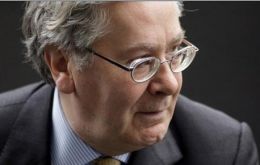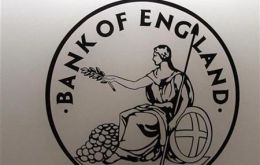MercoPress. South Atlantic News Agency
Tag: Bank of England
-
Friday, January 13th 2012 - 21:48 UTC
UK producer prices drop in December; further emergency stimulus anticipated

The prices of goods leaving Britain's factories surprisingly fell in December compared with November, confirming expectations that inflation is set to ease further this year, official data showed Friday.
-
Wednesday, December 14th 2011 - 17:04 UTC
October marks UK highest unemployment level in 17 years

The number of Britons out of work rose to its highest level in more than 17 years in October, and these jobless figures look set to rise further as firms facing the threat of a renewed recession cut back on staff.
-
Friday, December 9th 2011 - 06:11 UTC
Bank of England leaves rates unchanged at the record low 0.5%.

UK interest rates were held at a record low of 0.5% by the Bank of England's Monetary Policy Committee on Thursday.
-
Saturday, October 8th 2011 - 08:16 UTC
Moody’s downgrades 12 UK finance firms on fears BoE will not rescue weak banks

Moody's has downgraded the credit rating of 12 UK financial firms including Lloyds TSB, RBS, Nationwide and Santander UK. The ratings agency said it now believed the government was less likely to support firms that got into trouble.
-
Thursday, October 6th 2011 - 16:59 UTC
Bank of England agrees to inject £ 75 billion to shield the British economy

The Bank of England will inject 75 billion pounds to shield Britain's economy from the Euro zone debt crisis and keep a faltering recovery going, opting for an early, dramatic move to maximise the impact.
-
Thursday, September 8th 2011 - 22:13 UTC
Bank of England won’t extend liquidity program; leaves rates at minimum

UK interest rates have been held at a record low of 0.5% by the Bank of England's Monetary Policy Committee (MPC). Concerns about the strength of the UK economic recovery meant economists had expected rates to remain unchanged as they have been since March 2009.
-
Monday, August 22nd 2011 - 07:10 UTC
Venezuela has requested 99 tons of gold holdings from the Bank of England

Venezuela’s central bank has requested its 99 tons of gold holdings from the Bank of England, according to a bank statement sent by e-mail, citing the institution’s president Nelson Merentes.
-
Thursday, August 4th 2011 - 22:18 UTC
Bank of England adopts ‘wait and see’ attitude amid world turbulence

The Bank of England left its main interest rate at a record low 0.50% on Thursday for the 29th month in a row amid weak economic growth in Britain and a debt crisis in the Euro-zone. The quantitative easing QE program was also left stand-by at £200 billion.
-
Friday, July 8th 2011 - 06:00 UTC
Bank of England leaves rates on hold at record low 0.5%

The Bank of England's Monetary Policy Committee (MPC) has kept UK interest rates on hold at a record low of 0.5%. Economists had expected no move in rates because the latest data has shown the UK economic recovery remains weak.
-
Thursday, June 9th 2011 - 19:49 UTC
Bank of England leaves rates unchanged to bolster recovery

The Bank of England’s Monetary Policy Committee voted Thursday to maintain the official Bank Rate paid on commercial bank reserves at the record low 0.5%. The Committee also voted to maintain the stock of asset purchases financed by the issuance of central bank reserves at £200 billion.
